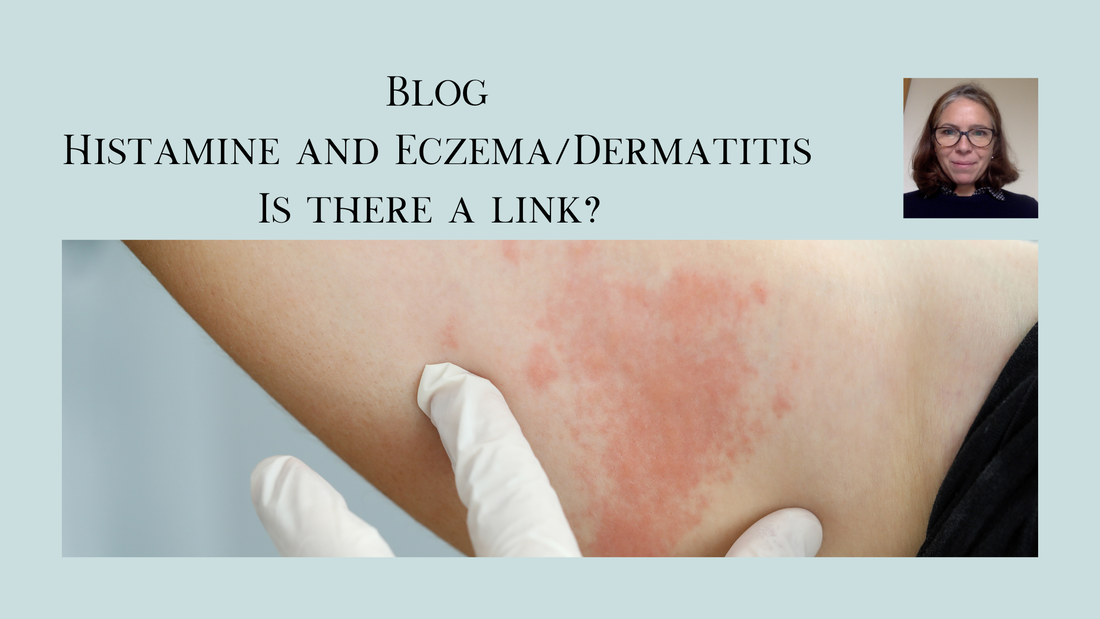ARTICLE Categories
All
|
|
Every so often a new health buzz word emerges. The new “thing” that, once resolved, will, theoretically, solve everything.
From the questions I get within my community forums or from clients, histamine seems to be the current molecule of interest, particularly in relation to skin, gut and autoimmune issues, but does it deserve this notoriety? There is a lot to unpick regarding histamine, so I have divided the topic into 5 separate articles. The first is published below and the next four will follow over the next month, so keep watching this space or sign-up for my emails to receive the articles direct to your inbox:
What is the histamine and eczema/dermatitis link? Today’s article covers:
What is histamine? Histamine is a neurotransmitter, produced by mast cells, found throughout the body, but specifically in the skin, respiratory system, and the gastrointestinal tract, but also by basophils, a type of white blood cell which is involved in an immune reaction. Histamine is mostly known for its involvement in the immune response cascade (one reaction, causing the next and so on). This neurotransmitter is directly responsible for itching, redness and swelling (inflammation) but is also involved in numerous other processes including stomach acid, contraction of smooth muscle (muscles involved with respiration and digestion amongst others), and the dilation of blood vessels. Whilst histamine, the neurotransmitter, is the main driver, there are four different types of histamine receptors (H Receptors) which determine the type or location of a histamine response. (2,3)
Histamine and the immune system, how does it work? When the body encounters an allergen, be it environmental (pollen or dust mites, for example) or food (e.g., gluten, dairy etc.) the immune system responds by producing immunoglobulin E (IgE) antibodies which bind to mast cells and basophils which then trigger the release of histamine. Histamine release makes blood vessels dilate resulting in blood rushing to the area and leading to the common signs of inflammation: redness, itching and swelling. Histamine is also involved in the inflammatory response when tissue (or skin) is damaged or infected, causing the blood vessels dilate, drawing blood flow and delivering white blood cells to the damaged area which then help to fight off possible infection. Histamine and eczema/dermatitis – what is the link? Atopic Eczema alone affects an estimated 20% of children and 10% of adults in the Western world (1), which is an absolutely massive number of people. If you suffer from any type of eczema/dermatitis you already know that it is a chronic inflammatory skin condition that can be dry, itchy, and inflamed, all symptoms linked to a histamine response. Most researchers agree that there is a link between histamine and eczema/dermatitis. Histamine triggers inflammation, causing itchiness, redness, swelling and testing has identified that individuals suffering from an eczema/dermatitis flare, have high levels of histamine. What is less clear is what the specific connection is. In other words, just as no two eczema/dermatitis sufferers appear to have the same triggers, the histamine connection may be different for everyone. In terms of current and recent research, the following three links have been specifically examined:
Research suggests that histamine’s role in eczema/dermatitis may go beyond its inflammatory role. Evidence has been found that it may contribute to the breakdown of the skin barrier, resulting in ‘Leaky Skin’, making skin less able to retain moisture and act as a protection against irritants. This means that potential allergens and irritants cross into the body more easily, triggering an immune response. Exploring the eczema types most linked to histamine. As we already know, not all eczema/dermatitis is alike, which means that not all types will necessarily have a histamine link, but those that are include:
In summary, here are my 7 top tips for managing histamine as a trigger for eczema/dermatitis:
Speak to your medical practitioner, Registered Nutritional Therapist or pharmacist adviser for further guidance. If on medication, please speak to your GP/consultant before making any changes to your diet. Histamine Masterclass - 1pm, Thursday 14th September. I will be holding an online Masterclass on histamine on Thursday 14th September 2023 at 1pm - claim your early bird ticket at £10. Don't worry if you can't attend live, you can send your questions in advance and the Masterclass will be emailed to all attendees post the event. Read more:
Interested in what I do and who I am? Go to my website: www.jessicafonteneaunutrition.com 1. Nutten S. Atopic dermatitis: Global epidemiology and risk factors. Ann Nutr Metab. 2015;66:8–16. 2. Buddenkotte J, Maurer M, Steinhoff M. Histamine and antihistamines in atopic dermatitis. Adv Exp Med Biol. 2010;709:73–80. 3. Patel RH; Mohiuddin SS. Biochemistry , Histamine. 2023;32491722.
0 Comments
Leave a Reply. |
AuthorI’m Jessica Fonteneau, I’m the eczema specialist and I help people Escape from the Eczema trap. Archives
April 2024
Catégories
All
|


 RSS Feed
RSS Feed